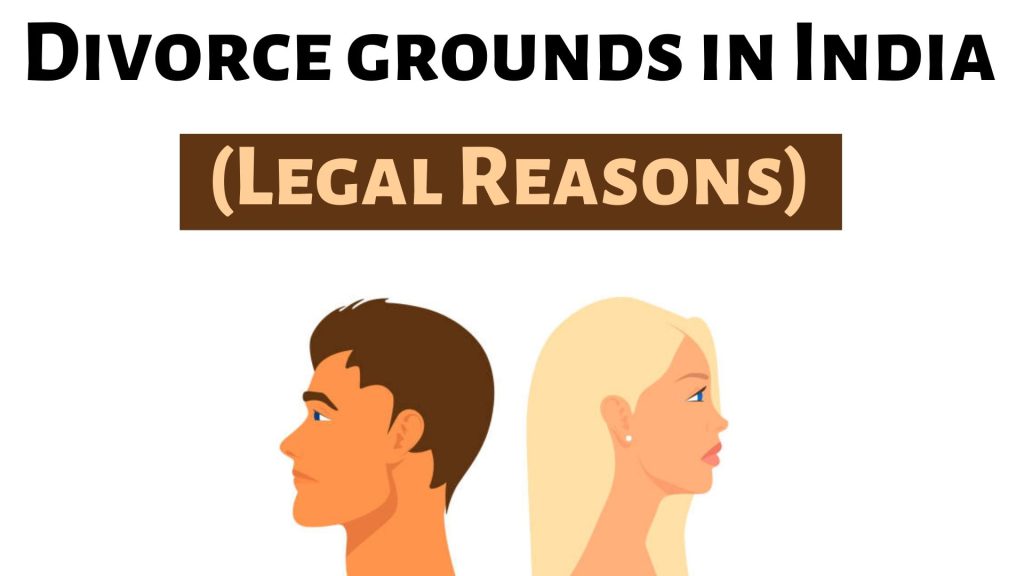Introduction
According to the reports, the number of divorces has doubled over the past two decades. Sometimes the decision to separate is mutual and sometimes there are some legal divorce grounds in India on which the couples decide to part ways. In this article, we are going to read what are the legal grounds for divorce in India.
Divorce grounds in India
Here are some legal divorce grounds in India under-
- The Hindu Marriage Act 1955
- Muslim marriage act 1939
- The Indian Divorce Act, 1869
- The Parsi Marriage and Divorce Act, 1936
Suggested Reading- 6 Reasons for divorce in India
Grounds for Divorce under the Hindu Marriage Act, 1955
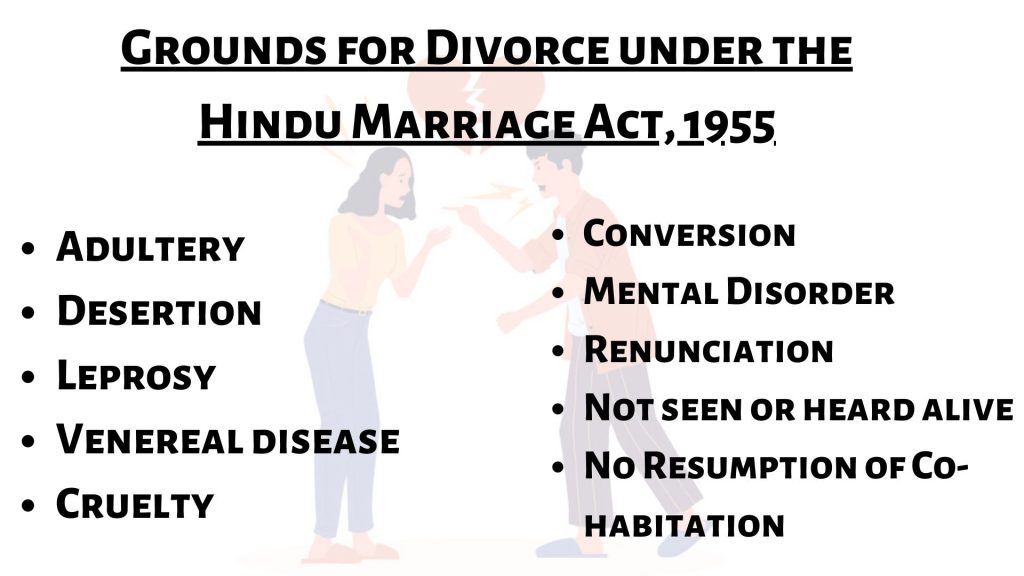
- Adultery
Adultery means having a sexual relationship outside the marriage. Adultery comes under criminal offence and the proper proof is required to establish this fact. An amendment to the law in 1976 states that one single act of adultery is enough for the petitioner to get a divorce.
- Desertion
Desertion means abandoning the partner voluntarily.
If one of the spouses voluntarily abandons the other spouse for two or more years then the abandoned partner can file for a divorce on the ground of desertion.
- Leprosy
In case of a ‘severe and incurable form of leprosy, a divorce petition can be filed by the other spouse based on this ground.
- Venereal disease
If your partner is suffering from a sexually transmitted disease, you can file for a divorce.
- Cruelty
A spouse can ask for a divorce if he/she is subjected to any kind of physical, mental, or emotional torture or injury that causes a threat to life and health. Ill-treatment, food being denied, domestic violence, abuse, and perverse sexual activity all are included in the act of cruelty.
- Conversion
You can file for a divorce against your spouse if he/she converts to another religion after marriage. For example, if at the time of marriage you and your husband are Hindu and after some year he/she converts to some other religion then, you have the full right to divorce your partner.
- Mental Disorder
If the spouse of the petitioner is suffering from a mental condition that is incurable and hence the couple cannot be expected to live together peacefully then in this case the couple can opt for a divorce.
- Renunciation
The spouse has the right to divorce the other spouse if she/she decides to leave all the materialistic desires and if he/she renounces all worldly affairs by embracing a religious order.
- Not seen or heard alive
If a person is not seen or heard alive by those who are expected to be ‘naturally heard of the person for a continuous period of seven years, the person is presumed to be dead. The other spouse should need to file a divorce if he/she is interested in remarriage.
- No Resumption of Co-habitation
It becomes a ground for divorce if the couple fails to resume their co-habitation after the court has passed a decree of separation.
The following are the grounds for divorce in India on which a petition can be filed only by the wife.
If the husband has indulged in rape, bestiality, and sodomy.
If the marriage is solemnized before the Hindu Marriage Act and the husband has again married another woman in spite of the first wife being alive, the first wife can seek a divorce.
A girl is entitled to file for a divorce if she was married before the age of fifteen and renounces the marriage before she attains eighteen years of age.
If there is no co-habitation for one year and the husband neglects the judgment of maintenance awarded to the wife by the court, the wife can contest a divorce.
Suggested Reading- 7 Aspects to keep in mind while filing for divorce
Grounds for Divorce under the Dissolution of Muslim Marriage act, 1939
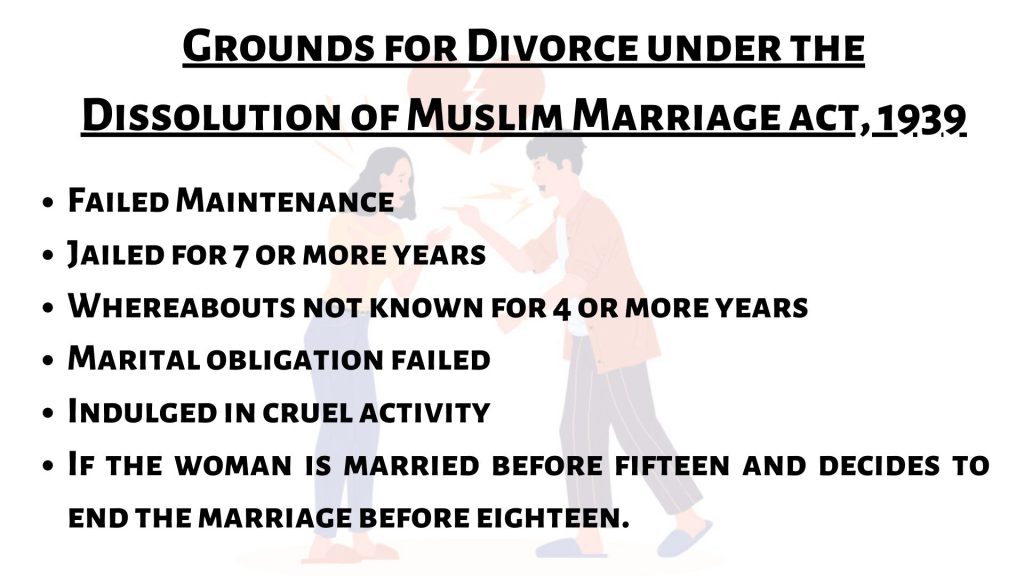
Based on the Dissolution of Muslim Marriage Act, 1939, A Muslim woman can seek divorce on the following grounds for divorce in India.
- The husband has failed to provide maintenance to the wife for at least two or more years.
- The Husband has been in jail for 7 or more years.
- The whereabouts of the husband are not known for a period of 4 years or more.
- The husband has failed to meet the marital obligation.
- The husband has indulged in cruel activity.
- If the woman is married before fifteen and decides to end the marriage before eighteen.
Grounds for Divorce under the Indian Divorce Act, 1869
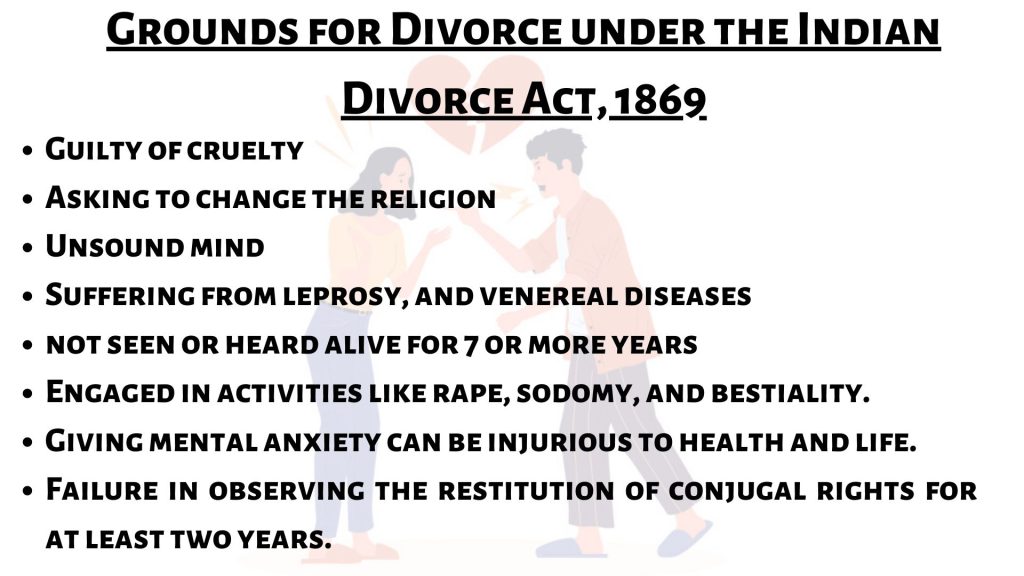
The following are the grounds of divorce mentioned under the Indian Divorce Act, 1869.
- If the husband is guilty of cruelty.
- If the husband asks the wife to change her religion.
- If one of the couples suffering from an unsound mind, leprosy, or communicable venereal disease for at least two years before the filing of the divorce.
- If the person has not been seen or heard alive for a period of 7 or more years.
- The wife can file for a divorce if the husband is engaged in activities like rape, sodomy, and bestiality.
- Inflicting cruelty and giving rise to mental anxiety that can be injurious to health and life.
- Failure in observing the restitution of conjugal rights for at least two years.
Grounds for Divorce under the Parsi Marriage and Divorce Act, 1936 (Amendment 1988)
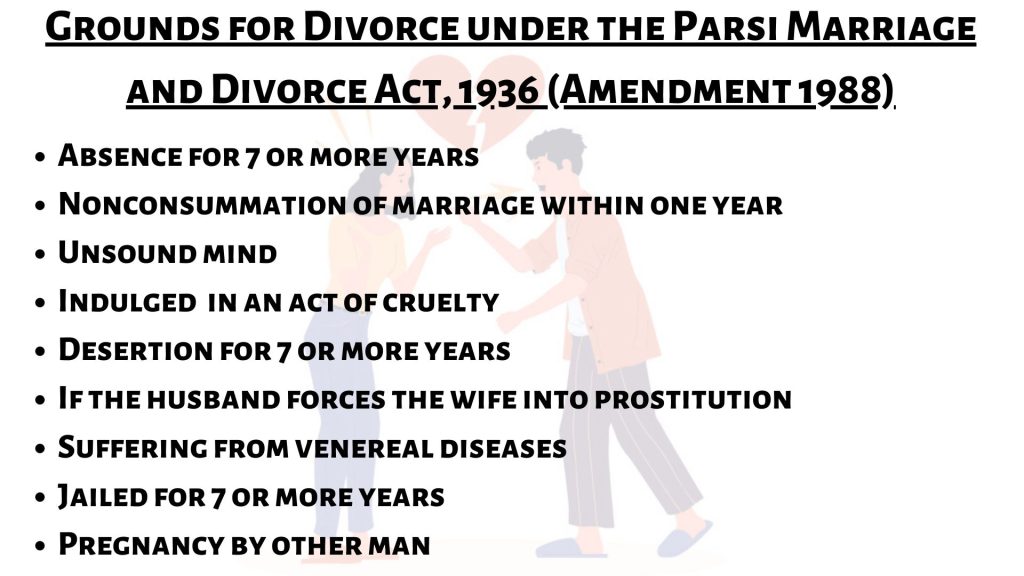
The following are the grounds for divorce in India included in the Parsi Marriage and Divorce Act, 1936, and the amendment of the same in 1988.
- There is the continued absence of the husband for seven or more years.
- If there is non-consummation of marriage within one year.
- If the other spouse is of unsound mind at the time of the marriage and the other spouse is not aware of this fact. In this case, the divorce should be filed within three years of marriage.
- If the spouse is involved in any act of cruelty.
- If one spouse has deserted the other spouse for 7 seven or more years.
- If the husband forces the wife into prostitution.
- If the husband or the wife suffered from venereal disease.
- If the spouse has been in jail for 7 or more years.
- Non-resumption of cohabitation after passing an order of maintenance or a decree of judicial separation.
- Pregnancy by some other man and if the husband is not aware of this fact during the time of marriage. The divorce must be filed within two years of marriage.
Conclusion
So these were some of the legal grounds for divorce in India. I hope this would have helped you in some or the other way. Do not forget to share this piece of information with someone who may need it now or in the future.
Suggested Reading- How to avoid paying alimony in India
